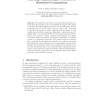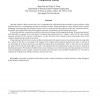354 search results - page 28 / 71 » Modal and Temporal Logics for Processes |
JOLLI
2002
13 years 7 months ago
2002
Temporal logic can be used to describe processes: their behaviour is characterized by a set of temporal models axiomatized by a temporal theory. Two types of models are most often ...
WDAG
2007
Springer
14 years 1 months ago
2007
Springer
Abstract. We examine the problem of detecting nested temporal predicates given the execution trace of a distributed program. We present a technique that allows efficient detection ...
OPODIS
2003
13 years 9 months ago
2003
Detecting whether a finite execution trace (or a computation) of a distributed program satisfies a given predicate, called predicate detection, is a fundamental problem in distr...
VL
2007
IEEE
14 years 2 months ago
2007
IEEE
Interval-valued computation is an unconventional computing paradigm. It is an idealization of classical 16-, 32-, 64- etc. bit based computations. It represents data as specific ...
ACL
1992
13 years 9 months ago
1992
The information state of an agent is changed when a text (in natural language) is processed. The meaning of a text can be taken to be this information state change potential. The ...


